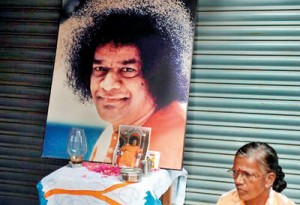Sunday Times 2
Why so many Indians flock to gurus
I don’t think many people were aware of the controversial Hindu guru Rampal before this week’s violent clashes between his supporters and the police.
But then India is a country of more than a billion people and tens of thousands of gurus.

Sai Baba's influence endures after his death (AFP)
There are gurus for rich and poor. Many of them command huge followings at home and overseas counting politicians, film and cricket stars, bureaucrats and ordinary people among their devotees. The world’s best known cricketer, Sachin Tendulkar, is a follower of Sai Baba, whose mystique and influence lasted long after his death in 2011.
Gurus also peddle influence as politicians run to them for advice. Proximity to a guru legitimises a politician and adds to his power, says sociologist Shiv Visvanathan. India’s most powerful Prime Minister, the late Indira Gandhi, would often turn to her yoga guru Dhirendra Brahmachari for advice.
Many of the gurus are also successful entrepreneurs and run massive business empires, selling traditional medicines, health products, yoga classes and spiritual therapies. They run schools, colleges and hospitals. Some of the gurus, according to Dr Vishvanathan, can make India’s best-known companies “sound like management amateurs”. A guru from Punjab, Gurmeet Ram Rahim Singh, who heads a popular religious sect, even performs at rock concerts and acts in films. Some gurus are adept at yoga, others are better known for their discourses, while somebody like India’s most famous woman guru, Mata Amritanandamayi, has made a name for herself by hugging people as a blessing and therapy.
The gurus also believe in what big companies call “corporate social responsibility”, or investing in communities and caring for the environment. So they supply drinking water to parched villages, run rehab programmes for prisoners and drug addicts, organise blood donation camps and open schools for poor children. Some of them build cricket stadiums and promote vegetarianism.
No wonder then that devotees are manic about their gurus. Ashutosh Maharaj, a guru from Punjab, was declared clinically dead in January this year, but his supporters have kept his body in a deep freezer confident that they will return to life to lead his flock. Although many are accused of sexual offences, shady property deals and even murder, they remain immensely popular with their faithful devotees.
So what accounts for India’s enduring relationship with gurus?
For one, in a fast-urbanising country bristling with ambition, frustration and confusion, gurus are like placebos for the uncertain masses. People flock to them, thinking that they can help give them the next big break in their lives. They look to them for miracle cures for their severely ill family members. In Gujarat’s Sabarkantha district, there is a guru who has thousands of sick followers and promises to cure them with magic. Many of them die, but the faith persists.
Also, most Indians believe in magic, miracle and faith healing. Sociologist Dipankar Gupta says Hinduism depends on magic more than other religions as “Hinduism does not have a single book and communion”. “If you are in a communion, you pray together, you have other kinds of solace,” he says. So many Indians depend on gurus to produce miracles and improve their lives.
“Gurus are essentially seen as magicians who promise miracles. You go to a guru hoping he will deliver things to you. Religion, as we know it, is just a gloss and doesn’t draw Indians to gurus in the first place,” says Prof. Gupta. As long as belief in magic and miracle survives and times remain uncertain, India’s gurus are assured a place in the sun.
(Courtesy BBC)

